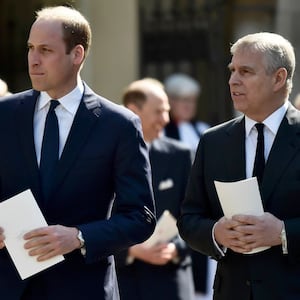Health
Parliament’s Power: Could Prince Andrew Lose His Title?

The future of Prince Andrew’s title hangs in the balance as discussions arise regarding Parliament’s ability to remove both his dukedom and the title of “prince.” This process, although complex, could potentially unfold if legislation is passed and receives Royal Assent from the King. Such a move would not only generate significant media attention but would also require discreet support from royal circles.
Recent revelations from a new biography detailing Prince Andrew’s life and controversies have intensified scrutiny around the Duke of York. The publication outlines a series of scandals, indiscretions, and moments of public embarrassment that have plagued him throughout his life. Among the most notable issues are connections to the Jeffrey Epstein case, where the Duke has been mentioned numerous times, including in contexts surrounding allegations of sexual misconduct.
In a report by The Daily Telegraph, the question posed was, “How do you solve a problem like Prince Andrew?” This query resonates even more now, following the release of additional documents related to Epstein, which mention the Duke with alarming frequency. Specifically, he was referenced 69 times in documents that contained terms such as “orgy” and “forced to have sexual relations.”
Given the ongoing controversies and the negative public perception surrounding Prince Andrew, the idea of legislative action to strip him of his titles has gained traction. While the process would be unprecedented, it highlights the growing demand for accountability among members of the royal family, particularly regarding their conduct and associations.
The mechanism by which Parliament could act involves drafting specific legislation aimed at revoking titles associated with the monarchy. This would necessitate a thorough debate in Parliament followed by a vote, ultimately requiring the King’s approval to finalize the decision. While such action could be viewed as a drastic measure, it reflects the evolving relationship between the monarchy and the public, especially as expectations for transparency and integrity continue to rise.
As the monarchy grapples with its modern identity, the case of Prince Andrew serves as a pivotal example of the challenges faced by the royal family. The repercussions of his actions have not only impacted his reputation but have also drawn attention to the institution as a whole.
The discussion surrounding Prince Andrew’s titles is emblematic of broader societal changes and the increasing demand for accountability among public figures. As the situation develops, it remains to be seen whether Parliament will take action, and if so, how it will shape the future of the British monarchy.
In a landscape where public opinion is shifting, the role of Parliament in determining the fate of royal titles may become a crucial aspect of maintaining the monarchy’s legitimacy and relevance in the 21st century.
-

 World4 months ago
World4 months agoTest Your Knowledge: Take the Herald’s Afternoon Quiz Today
-

 Sports4 months ago
Sports4 months agoPM Faces Backlash from Fans During Netball Trophy Ceremony
-

 Lifestyle4 months ago
Lifestyle4 months agoDunedin Designers Win Top Award at Hokonui Fashion Event
-

 Entertainment4 months ago
Entertainment4 months agoExperience the Excitement of ‘Chief of War’ in Oʻahu
-

 Sports4 months ago
Sports4 months agoLiam Lawson Launches New Era for Racing Bulls with Strong Start
-

 World5 months ago
World5 months agoCoalition Forms to Preserve Māori Wards in Hawke’s Bay
-

 Health4 months ago
Health4 months agoWalking Faster Offers Major Health Benefits for Older Adults
-

 Lifestyle4 months ago
Lifestyle4 months agoDisney Fan Reveals Dress Code Tips for Park Visitors
-

 Politics4 months ago
Politics4 months agoScots Rally with Humor and Music to Protest Trump’s Visit
-

 Top Stories5 months ago
Top Stories5 months agoUK and India Finalize Trade Deal to Boost Economic Ties
-

 Health2 months ago
Health2 months agoRadio Host Jay-Jay Feeney’s Partner Secures Visa to Stay in NZ
-

 World5 months ago
World5 months agoHuntly Begins Water Pipe Flushing to Resolve Brown Water Issue









